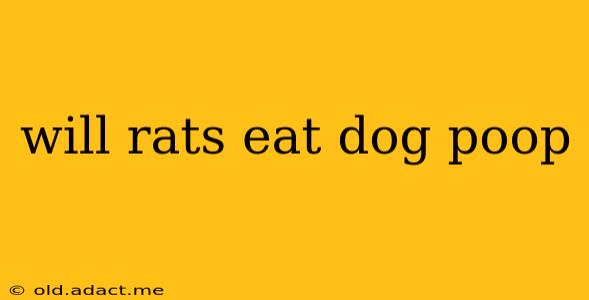Rats, opportunistic omnivores, are known for their adaptable diets. While their preferred food sources include grains, seeds, fruits, and vegetables, their scavenging nature leads them to consume a wide variety of items, including less-than-appetizing substances. So, the question remains: will rats eat dog poop? The short answer is yes, but let's delve deeper into the reasons why and the implications for managing rat infestations.
Why Would Rats Eat Dog Poop?
Rats are driven by survival, and their dietary choices are largely dictated by availability and nutritional needs. Dog feces, while not ideal, can offer some nutritional value, containing undigested food particles and other organic matter. Here's a breakdown of the reasons:
- Nutritional Opportunism: Rats will consume almost anything that provides energy. Dog poop, despite its unappealing nature to humans, contains remnants of the dog's food, offering a source of protein, carbohydrates, and possibly fats.
- Lack of Alternative Food Sources: In environments with limited access to preferred food sources, rats will resort to scavenging, and dog feces might become a viable option, albeit a less desirable one.
- Coprophagy in Rodents: While not necessarily the same as consuming dog feces, coprophagy (eating one's own feces) is common in some rodent species to extract additional nutrients missed during the initial digestion process. This behavior demonstrates a willingness to consume fecal matter for nutritional gain.
What are the Health Risks Associated with Rats Eating Dog Poop?
While rats can tolerate consuming dog poop, it does present health risks:
- Parasites and Diseases: Dog feces can harbor various parasites and pathogens, such as roundworms, hookworms, and Giardia. These can infect rats, potentially leading to illness or even death. Furthermore, a rat consuming infected feces could potentially spread these parasites or diseases to other animals or even humans.
- Toxins and Medications: If the dog has ingested toxins or medications, these can be present in the feces, posing further health risks to the rat.
How Can I Prevent Rats from Eating Dog Poop?
Preventing rats from accessing dog feces is crucial for both the health of the rats and the prevention of disease transmission. Here are some effective strategies:
- Prompt and Regular Cleanup: The most effective method is to promptly remove and dispose of dog feces. Use sealed bags and dispose of them in appropriate bins regularly.
- Secure Storage of Pet Food: Ensure dog food is stored in sealed containers to prevent rats from accessing it. This reduces the likelihood of them resorting to less desirable food sources.
- Proper Waste Disposal: Avoid leaving any food scraps or other organic matter lying around, as this attracts rats in the first place.
- Rat Control Measures: Implement rat control measures, such as traps, to reduce rat populations. This is particularly important in areas with recurring rat problems.
What other things do rats eat?
Rats are known for their incredibly diverse diets. Beyond dog feces, they consume a wide range of items including:
- Fruits and Vegetables: They're particularly fond of sweet fruits and juicy vegetables.
- Grains and Seeds: These form a significant part of their natural diet.
- Nuts: Rats are attracted to the high fat and calorie content of nuts.
- Meat: They are opportunistic omnivores and will consume meat scraps or even insects.
- Garbage: Rats are known to scavenge in garbage cans and bins.
Are there specific breeds of rats more likely to consume dog feces?
There's no scientific evidence suggesting specific rat breeds are more likely to eat dog feces than others. Their scavenging behavior is driven primarily by opportunity and nutritional need, not breed-specific characteristics.
By understanding the reasons why rats might consume dog feces and taking proactive steps to manage waste and rat populations, you can minimize the risk of disease transmission and maintain a cleaner, healthier environment. Remember, responsible waste management and pest control are crucial aspects of home hygiene and overall health.
